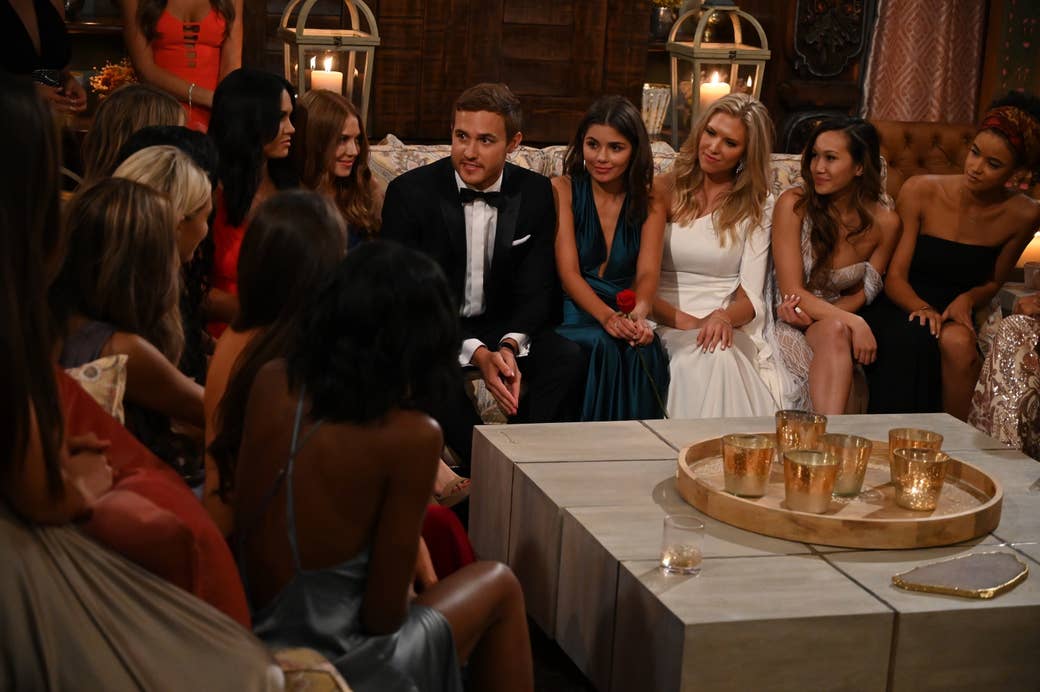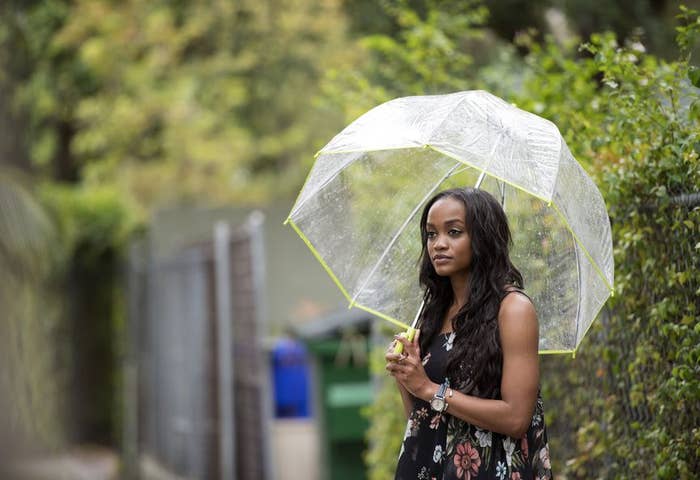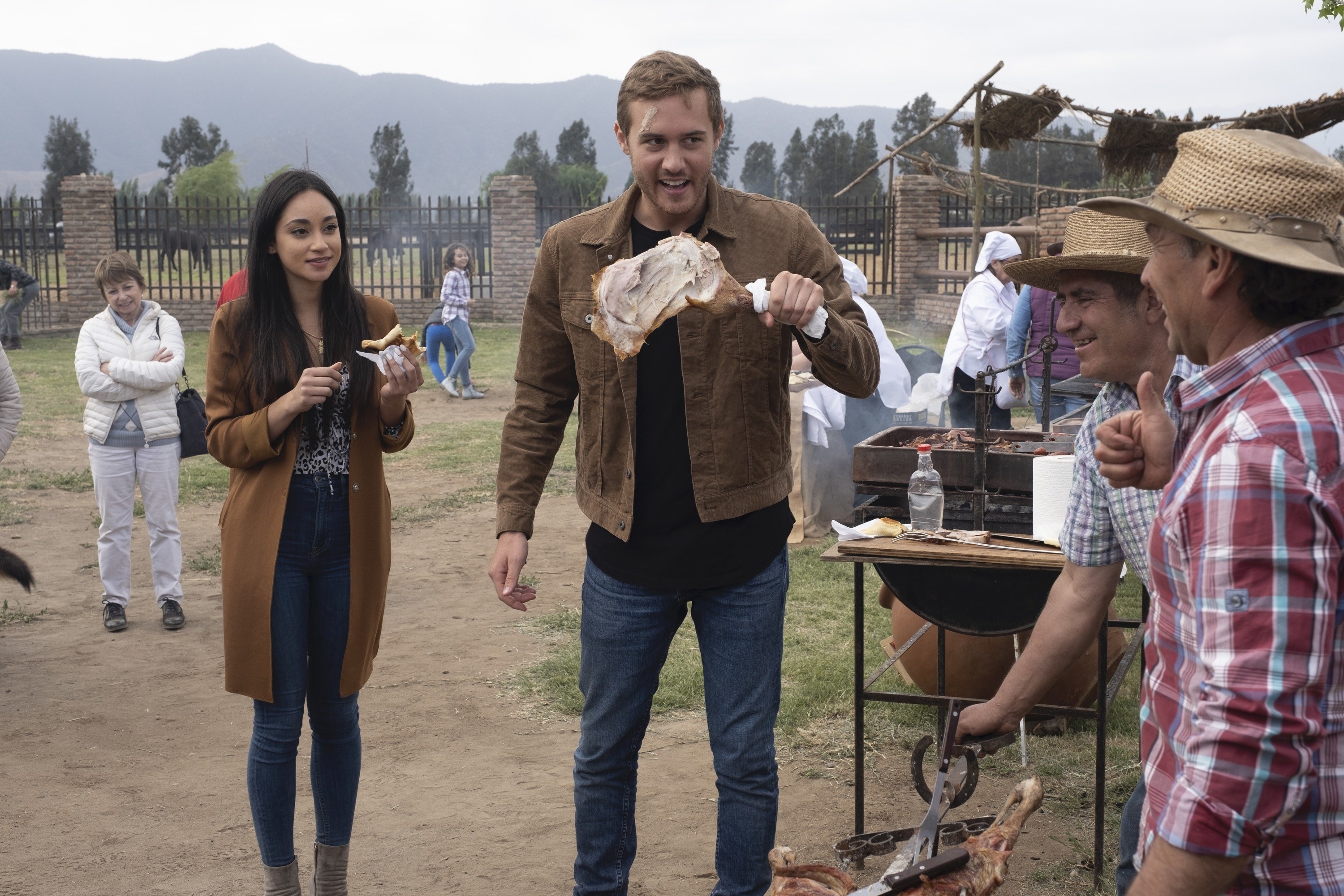
Every season of The Bachelor promises to be, as host Chris Harrison intones, “the most dramatic EVER.” And while it’s easy to mock that huckstery promise, keeping the show current and its melodramatic storylines surprising for its longtime audience isn’t easy. The Bachelor franchise, which debuted in 2002, has been airing on ABC for almost two decades. The original series spawned sister program The Bachelorette in 2003 and racier spinoffs like Bachelor in Paradise. The show’s tropes — like the endless squabbles over contestants being there for the “right reasons” — have become widely parodied staples in the pop culture lexicon.
Throughout its run, The Bachelor(ette) has been criticized for its perpetuation of outdated gender norms and beauty standards and lack of racial diversity. The 2017 ratings dip after the casting of the first black Bachelorette, Rachel Lindsay, did nothing to help chip away at the brand’s aggressive whiteness. And even as dating culture in the real world moved on from the franchise’s rosily retrograde ideals, with online swiping transforming the romantic landscape, the show stuck to its basic script of rose ceremonies, hometown visits, and marriage proposals.
But The Bachelor has been tinkering with its formula in recent years, most noticeably by amplifying drama among — and at the expense of — the show’s women. Ratings recuperated during the last cycle of (not incidentally, white) Bachelor and Bachelorette seasons, with fence-jumping virgin Bachelor Colton Underwood and then with Hannah Brown, and they have stayed on track for pilot Peter Weber’s current season. But even by the standards set by the show, many fans and critics are up in arms about the level of toxic drama on display this season. It might be working for now, as far as ratings go, but the show’s brand of romantic escapism appears increasingly marred and untenable in the long run.

For at least a decade there have been claims that the Bachelor franchise has jumped the shark. Old-school scripted melodramas — like soaps — could count on an endless supply of surprise deaths and season-climax marriages and breakups to keep viewers hooked. But reality shows like The Bachelor can’t exactly kill people off (though it loves dramatic accidents) and a marriage plot is already the point.
So pretty early on, the show started playing with the formula — editing in, for instance, how the contestants’ real lives were supposedly impacting their being on the show. In 2009, during Jillian Harris’s Bachelorette season, contestant Ed Swiderski quit the show for his job (!) only to return and become Harris’s final pick. During the following Bachelor season, Ali Fedotowsky did the same. Host Chris Harrison pushed back against fans’ complaints that Fedotowsky “pulled an Ed,” telling TV Guide that the exits were not “tricks” but “a sign of the times and how important a job is.” Thus, the show was able to update the brand with a new trope while hewing to its narrative of romance and the stumbling blocks thereof.
But as other streaming-era dating shows have become less white and have updated themselves for the era of online dating, the Bachelor attempted to evolve again. And reality has started intruding into the rose universe in a less brand-friendly way. In 2017, Rachel Lindsay was announced as the first black Bachelorette. There were many ways the show could have framed the season — for instance, as a way of opening up discussions around interracial dating. Instead, producers turned contestant Lee Garrett’s racism and his fights with fellow contestant Kenny King into just another entertaining storyline. The show made Lindsay herself confront Garrett, as if it were her responsibility to be both the show’s multicultural window dressing and its moral arbiter.
Reality has started intruding into the rose universe in a less brand-friendly way.
In subsequent interviews, creator Mike Fleiss focused on the fallout — the season’s ratings took a nosedive, losing a million viewers — rather than the way the show itself was part of the problem. “How else are you going to explain the fact that she’s down in the ratings, when — black or white — she was an unbelievable bachelorette?” he told the New York Times. “It revealed something about our fans.” But it also revealed something about the show’s inability to expand from its very narrow formula.
Fleiss claimed he was “raring” to feature another nonwhite lead, but Bachelor historian Suzannah Showler has pointed out that the show’s freakout about ratings even impacted the selection of the following Bachelor protagonist. None of the three 2017 Bachelorette runners-up were picked, as has become customary: One of the two white finalists wasn’t ready for marriage, the other one declined, and the black finalist wasn’t even asked.
Instead, producers dipped far back into the archive to pick Arie Luyendyk Jr., whom no one was rooting for. Ratings dipped again, except for the finale, which was widely criticized for Luyendyk’s — and the show’s — humiliation of finalist Becca Kufrin. Ratings didn’t improve much during her subsequent season as the Bachelorette, which was once again mired in controversy when her selected suitor’s racist and anti-trans Instagram posts popped up online.
A big part of the appeal of the franchise is having the Bachelor or Bachelorette figure out whom they love without any outside interference (beyond the drama caused on the show itself); the contestants don’t even have internet access. But this keeps resulting in dirty (racist) laundry getting exposed only after the show has been filmed; this season, viewers discovered that contestant Victoria Fuller had modeled for a “White Lives Matter” clothing brand.
The producers could make the show more relevant by being more intentional about casting nonwhite leads, and more thoughtful about how they deal with race. Lindsay rightly critiqued the way Kufrin, unlike her, was mostly protected from the controversy over Garrett Yrigoyen’s Instagram throughout her season.
At the very least, the Bachelor franchise could show the protagonists going through their suitors’ social media — or somehow make that part of the drama, like in Netflix’s recent The Circle. Instead, producers have relied on a combination of increasingly toxic casting strategies and fourth wall–breaking to heighten the drama. And that has annoyed the fanbase — even while it’s undeniably working for the ratings.
The Bachelor has always been more about the drama between its women contestants than about the search for Mr. Right. Bringing together complete strangers and locking them in a house while they date the same man is a breeding ground for heightened and highly editable emotions. And for years the “organic” drama of that scenario seemed to be enough to keep viewers tuning in. But the dramatic strategy has recently pivoted into tropes familiar to any viewer of Real Housewives: bringing in women who have histories outside of the show.
Last year, during Underwood’s season, the show upped the drama quotient by featuring two Miss USA 2018 contestants: Hannah Brown from Alabama and Caelynn Miller-Keyes from North Carolina. It’s not odd that two women from the same industry were cast; after all, there are so many personal trainers on The Bachelorette that they’ve been rebranded as “entrepreneurs.” But the preexisting rivalry between Brown and Miller-Keyes was brought into the season’s arc by design, and their competing "she said, she said" accounts about their time on the pageant became one of the biggest storylines. The truth about the feud was never established on the show. Miller-Keyes was eventually eliminated (and went on to find lower-key love on Bachelor in Paradise), while Brown’s journey — about learning to grow out of her too-perfect pageant demeanor — helped give her a storyline as the protagonist on the following season of The Bachelorette.
This strategy of manufacturing intrigue was evidently deemed so successful for the show that this season of The Bachelor, two former pageant participants were once again cast to compete for Peter Weber’s affections: Alayah Benavidez (Miss Texas 2019) and Victoria Paul (Miss Louisiana 2019). In one episode, Paul revealed to Weber that Benavidez had asked her to “lie” about knowing her from before. These dramatic histories add extraneous controversy but nothing else to the arc of the show. Because the castmates on a show like Real Housewives coexist and interact through multiple seasons, their relationships and alliances get fleshed out in a deeper way, and there is a balance between cycles of friendship and conflict. On The Bachelor, it just flattens most of the show’s drama into petty conflict.
The show is now less cringey for its romantic entanglements than for the way it keeps exposing the humiliations required to exist in the reality television–dominated entertainment industry.
In recent seasons, like many aging and successful reality TV franchises, The Bachelor has started letting cast members acknowledge they’re on a television show and that they understand its mechanics. Real Housewives once again provides a good counter-model of how this can work. Because the women there are depicted in a variety of contexts — their families, their workplaces, and promoting their brands and products on the show — letting down the fourth wall has added to the viewers’ understanding of the women’s motivations and characterizations. The infamous blowout between Bethenny Frankel and Jill Zarin on Season 3 of Real Housewives of New York became a lot clearer for viewers when the women acknowledged during the reunion how their actions on camera started to be shaped by being on the show.
In contrast, because The Bachelor is not about its contestants’ lives in general, this shift has mostly just allowed them to be more specific in how they accuse each other of not being there “for the right reasons” — like claiming someone is angling to be the next Bachelorette or to promote an Instagram career. “It really makes me sick that people like you come in here trying to brand themselves, and all you’re looking for is just a hashtag,” one contestant this season told another (a fashion blogger), who retorted: “Watch this over and see who you really are, honey; I’m not the villain of the season, honey.”
Watching the contestants volley back and forth about the show as a branding opportunity is almost unpleasantly real — a not-very-romantic reminder of the women’s lack of agency and the ruthlessness of the digital attention economy. In fact, perhaps the most shocking moment of this season so far came when — for the first time — the musical guest was involved in the drama. As contestant Victoria Fuller (the same one caught in the racism controversy) was on a date with Weber, the show surprised them, as it usually does, with a musical serenade — in this case provided by country music performer Chase Rice. But it turned out Fuller had previously dated him, and viewers were treated to her tearfully wondering why he had been brought on the show. (In his words, they had briefly “hung out.”)
Their chat, initially away from Weber’s eyes, created some of the most awkward reality television ever, not because of anything they discussed but because it was bonkers to see a musical guest — who just needed the exposure — subjected to the Bachelor’s drama vortex. The show is now less cringey for its romantic entanglements than for the way it keeps exposing the humiliations required to exist in the reality television–dominated entertainment industry.

There’s always been a ridiculous quality to the glossy and outdated view of romance and courtship on The Bachelor and Bachelorette, but that’s part of the appeal for fans. And producers have at various points signaled that they’re in on the joke, inviting comedians like Amy Schumer and Billy Eichner to appear as guests and poke fun at the show, or running an over-the-top Ghost parody ad during the Super Bowl this year. They’ve even moved away from the central marriage plot somewhat; Underwood went off script (iconically — and effortlessly — jumping a fence in the process) and spurned his two official finalists in favor of Cassie Randolph, whom he didn’t get engaged to. Brown’s Bachelorette season last year also ended with no happily ever after.
But the show now exists amid a plethora of other dating reality shows that are less old-fashioned — like MTV’s revamped, sexually fluid Are You the One? or Netflix’s Dating Around — which are praised for bringing a less contrived form of romance back to reality TV and capturing the exhaustion of dating in the online era. In contrast, The Bachelor keeps getting too real in ways it isn’t set up to handle — as with the multiple racism controversies, the latest musical guest episode, or with the gratuitous “mean girls” drama that just highlights the gendered banality of the flagship show’s premise.
Last night’s “hometowns” episode and the fallout from it illustrates the chaotic state of the franchise. Weber was visiting Victoria F’s hometown when an ex-girlfriend with an inexplicably blurred-out face approached him to warn him that Fuller, who has emerged as the season’s clearest villain, had broken up several relationships — which didn’t stop him from awarding her a rose. Meanwhile, on social media this past weekend, Fuller was busy apologizing for her “White Lives Matter” modeling.
Now there are conspiracy theories circulating around this season that Weber actually ends up with a producer, a symptom of how the show only keeps getting more insular and self-referential rather than updating itself to reflect or interact with the real world. There are also rumors that the show is planning a live ending to avoid spoilers. But if the show provided a more interesting journey, it wouldn’t have to be so worried about the results getting leaked.
Even former Bachelor contestant and fan-favorite Ashley Iaconetti called out the show — albeit in the timid terms that Bachelor Nation participants who want to stay on the franchise’s good side must use. When she was asked on a podcast if she would let her daughter go on it, she said no: “At the rate that the show is evolving ... I wouldn’t want them in that catty environment.”
It’s becoming increasingly clear that the biggest question surrounding The Bachelor is no longer who will find true love onscreen, but how much longer the show can keep ratings steady and fans happy while stirring up drama — for the wrong reasons. ●
CORRECTION
In the Miss USA 2018 pageant, Hannah Brown represented Alabama, and Caelynn Miller-Keyes represented North Carolina; a previous version of this story misidentified their states.
